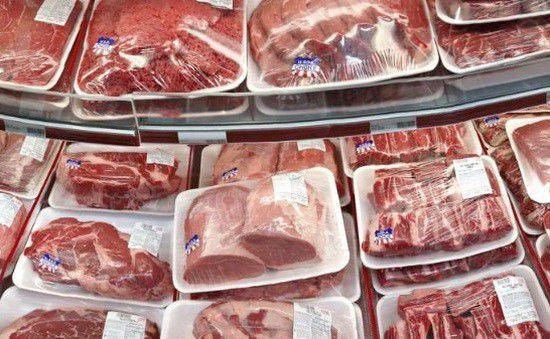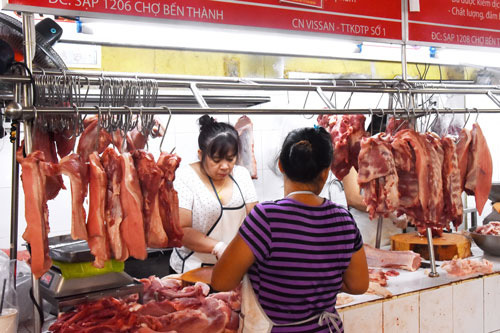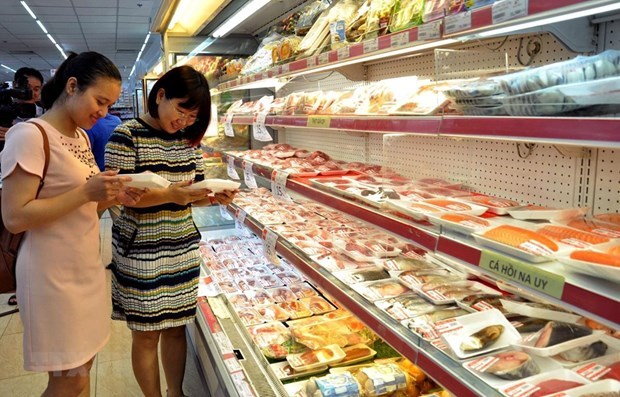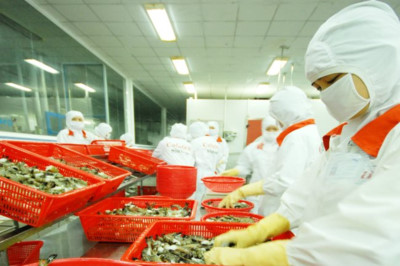- © Copyright of Vietnamnet Global.
- Tel: 024 3772 7988 Fax: (024) 37722734
- Email: [email protected]
import tariff
Update news import tariff
Pork imports surge due to high demand as Tet approaches
 Pork imports rocketed over the last two months as market demand surges ahead the Tet (Lunar New Year) holiday, which is only a few weeks away.
Pork imports rocketed over the last two months as market demand surges ahead the Tet (Lunar New Year) holiday, which is only a few weeks away.
Will importing pork stabilize domestic prices in Vietnam?
 The plan to increase pork imports to make up for domestic shortages won’t be easy to implement as the global price has increased sharply.
The plan to increase pork imports to make up for domestic shortages won’t be easy to implement as the global price has increased sharply.
Finance ministry proposes cutting import taxes on chicken, pork
 The Ministry of Finance has recently sent Dispatch No.14813/BTC-CST to competent ministries and sectors, suggesting cutting import on chicken and pork products.
The Ministry of Finance has recently sent Dispatch No.14813/BTC-CST to competent ministries and sectors, suggesting cutting import on chicken and pork products.
Risks are high
 In the context of a tense global trade war, while a new wave of investment inflow into Vietnam has yet to unleash, risks facing Vietnamese enterprises as well as the entire economy have surfaced.
In the context of a tense global trade war, while a new wave of investment inflow into Vietnam has yet to unleash, risks facing Vietnamese enterprises as well as the entire economy have surfaced.
Dung Quat Refinery anticipates losses after crude oil import tariff
Managers of the Binh Son Refining & Petrochemical JSC (BSR) have expressed their concern that Dung Quat Refinery may take a loss because of the crude oil import tariff of 5 percent.
Fuel imports from Korea shoot up
VietNamNet Bridge – Vietnam had spent US$485 million importing 1.06 million tons of fuels from South Korea in the year to August, up a staggering 573% in volume year-on-year,
Domestic sector loses forestry market to foreigners
The domestic sector has lost the local and export forestry markets to the foreign sector, Huynh Van Hanh, general director of the Handicraft and Wood Industry Association of Ho Chi Minh City has said.
Steel industry needs government protection to survive: experts
In 2015, China topped the world in terms of steel output (803.8 million tons), exporting 111.6 million tons. Meanwhile, Vietnam ranked seventh in the world and the first in South East Asia in steel imports (16.3 million tons).
Gloomy future for VN steel industry
VietNamNet Bridge - Steel mills now have to struggle to compete with imports from China. If the Ministry of Industry and Trade (MOIT) does not take temporary safeguard measures, a series of enterprises will go bankrupt.
Vietnamese fashion brands warned about more competitive future
When import tariffs on fashion products fall from 20 percent to zero percent after the Trans Pacific Partnership Agreement (TPP) takes effect, Vietnamese fashion brands are expected to encounter significant challenges.
Will foreign investors leave because the domestic market is too small?
VietNamNet Bridge - Some foreign investors have warned that they may leave Vietnam because of unfavorable conditions to do business. However, Vietnamese businesses and analysts believe they will stay in the country.
MOF slashes auto part import tariffs to protect local production
Citing local production protection, the Ministry of Finance (MOF) wants to ease the import tariffs on automobile parts. However, the move could 'fatten’ foreign invested enterprises (FIEs) only, while local manufacturers will not see benefits.
MOF continues to cherish Vietnam’s automobile dream
While experts remain pessimistic about Vietnam’s automobile industry, pointing out that its great efforts in the last several decades have been in vain, the Ministry of Finance (MOF) still puts high hopes on the industry’s development.
Vietnam’s preferential import tariffs updated
VietNamNet Bridge – Vietnam’s preferential import tariff rates for 2015-2018 were introduced to domestic firms during a workshop in Hanoi on July 15 as the country realises its commitments under the ASEAN Trade in Goods Agreement.
China will have to pay for TPP membership: experts
VietNamNet Bridge - All Trans Pacific Partnership (TPP) members, including Vietnam, look at China, which is now considering joining the free trade area, with suspicious eyes.
Chinese steel imports crowd out domestically made product
Though demand is predicted to increase by 15 percent in 2015, steel manufacturers still anticipate a difficult year ahead because supply from both domestic sources and imports will increase even more sharply.
Vietnam’s status as catfish-export leader threatened by Asian rivals
VietNamNet Bridge – Vietnam is facing a high risk of losing export markets to emerging rivals in Asia who are planning to join the world market.
Vinacomin can’t find coal buyers as buyers shun contracts
VietNamNet Bridge – The Vietnam Coal and Mineral Industries (Vinacomin) Group plans to sell 35 million tons of coal domestically, but its most loyal customers are hesitant to sign contracts.
Petroleum distributors claim self-determination in pricing policy
Petroleum enterprises have launched a new campaign to ask for the right to determine the retail petrol prices themselves, saying that the market rules need to be applied in a market economy.
China may increase its investments in textiles and garments in Vietnam
Vietnamese textile and garment companies have warned that they would have more redoubtable rivals as China may increase its investments in Vietnam once the Trans Pacific Partnership TPP is signed.



















